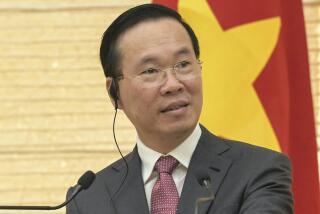Chinese President’s Ambitions Boosted as Ally Rises and Rival Falls
- Share via
BEIJING — President Jiang Zemin’s position as the leading candidate to succeed Deng Xiaoping at the helm of China got a boost Thursday when a key ally was named to head an important military body.
As Jiang’s star was rising, former Beijing Mayor and Politburo member Chen Xitong was stripped of all his party posts because of alleged massive corruption in his Beijing administration.
Chen, who was placed under house arrest in the spring, was the nation’s first Politburo member to be purged for corruption.
As part of his campaign to build credibility for the party and promote his own candidacy to replace Deng, Jiang had launched a national anti-corruption drive, and he promised that even top officials would fall.
In a report that concluded a four-day plenary meeting of the Communist Party Central Committee, the party leadership said Chen “led a dissolute and extravagant life, abused power to seek illegal interests for his relatives and other people and accepted valuable gifts by taking advantage of his position and while performing public duties.”
Chen has been accused of sharing in the spoils of a $37-million kickback scandal orchestrated by a top aide, who committed suicide.
The dismissal came a week before China is to host an international conference on public corruption.
No one rules China without the support of the military, and Jiang is chairman of the Central Military Commission. But for several years, he has been pushing for the appointment of Defense Minister Chi Haotian, his main backer in the senior army ranks, to the military commission vice-chairmanship.
On Thursday, the Central Committee granted his wish, electing Chi as one of four vice chairmen of the military committee, which carries a virtual veto over who will succeed Deng, who turned 91 in August.
“Overall, this looks good for Jiang,” commented Tai Ming Cheung, political-military analyst for Kim Eng Securities in Hong Kong. “It is a major step toward consolidating his grip on the military. He’s well on his way to getting the military on his side.”
In what some analysts viewed as a “counterbalancing” gesture, the Central Committee also appointed a longtime Deng ally, Gen. Zhang Wannian, as another vice chairman. Zhang is reported to be somewhat closer to Deng than to Jiang.
Chi, 66, and Zhang, 67, are both relatively young in China’s power scheme. They join aging veterans Liu Huaqing, 79, and Zhang Zhen, 81, as vice chairmen.
*
Also on Thursday, the Central Committee announced its approval of a five-year economic plan covering the end of this century.
According to reports in the Hong Kong press, the most heated debates in the meeting were sparked by committee members from southern China who opposed changes in China’s five “special economic zones”--Shenzen, Hainan, Xiamen, Shantou and Zhuhai--that are located on the south coast of China.
By offering tax breaks and other incentives, the zones have been able to attract more than 25% of all foreign investment in China.
Some intellectuals and political leaders from landlocked provinces have pushed for an elimination of the special status of the zones so that wealth and jobs can be more evenly distributed.
But the party leadership decided to leave the special zones intact. At the same time, they listed narrowing “the gap in development between different regions” as one of the party’s top priorities.
More to Read
Sign up for Essential California
The most important California stories and recommendations in your inbox every morning.
You may occasionally receive promotional content from the Los Angeles Times.










